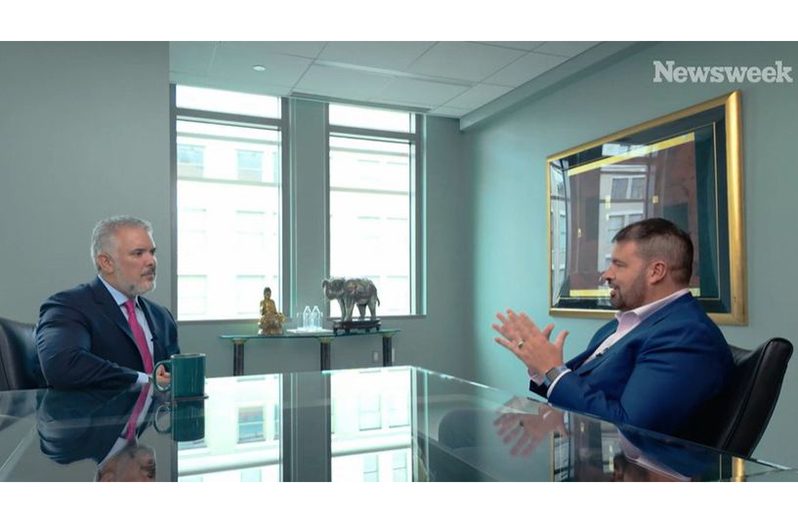–former Colombian President says Venezuela’s President using border controversy to distract from internal struggle
–warns of ‘strong’ response if Guyana’s sovereignty is violated
FORMER Colombian President Ivan Duque condemned Venezuelan President Nicolas Maduro’s attempts to leverage the border controversy with Guyana to distract from internal challenges and to rally support ahead of Venezuela’s upcoming elections.
In a recent interview with Arick Wierson for Newsweek Magazine, Duque discussed Maduro’s recent moves to assert Venezuela’s claim over Guyana’s resource-rich Essequibo region, despite ongoing proceedings before the International Court of Justice (ICJ).
Lawmakers allied to Maduro approved the creation of a new state in Guyana’s territory, citing a controversial December referendum as justification.
Duque expressed his concerns, stating: “Maduro is desperate to remain in power… He’s trying to use Guyana as an escape goat for using nationalistic speech.”
Referencing Guyana’s sovereignty over Essequibo for over a century, Duque added: “Essequibo has been in the hands and sovereignty of Guyana for more than 100 years… Maduro has tried to threaten Guyana that he’s going to take away that territory.”
President Maduro’s refusal to recognise the jurisdiction of the ICJ adds complexity to the situation.
However, Duque asserted that the international community would respond “strongly” to any attempt by Maduro to use force against Guyana.
Duque elaborated: “According to the Treaty of Reciprocal Assistance… there’s going to be a very strong response if he tries to use force against Guyana.”
He also dismissed the notion of Maduro having the military capacity to invade and sustain an occupation in Guyana, labelling it a “very stupid card” that would elicit an immediate and robust international response.
“He better not play with that because he knows that if he tries to play the card, he’s going to receive a very strong response,” Duque said.
In addition to geopolitical concerns, he highlighted the environmental implications of Maduro’s actions.
Duque praised Guyana for its efforts in conservation and protection of the Essequibo region, warning that any attempt by Maduro to assert control would result in an “environmental disaster.”
He said that on a purely conservation and protection of nature scope, Guyana has been able to keep a territory with basically no deforestation, having 85 per cent of the country in tropical forest, being one of the leaders in the world as it regards the campaign for nature.
Turning attention to Maduro’s attempts to rally support by focusing on historical grievances, doubts persist over the legitimacy of the December referendum and its impact on regional stability.
CONFIDENCE IN LEGAL PROCEEDINGS
The former Colombian President expressed confidence in Guyana’s position before the ICJ, citing strong international support and the country’s track record in conservation and environmental protection.
“Guyana is requesting that process before the ICJ keeps on going where they have made not only a legitimate defence of their sovereignty and their interests. But I also believe that Guyana will prevail because I think the judicial arguments that Guyana has presented before the ICJ are [solid],” he said.
Maduro’s tactics, intended to bolster his political position, have faced criticism for their questionable nature and potential ramifications on regional stability.
This action by President Maduro has triggered fierce condemnation not only from Guyana, but also international and regional bodies.
Describing the action as “a flagrant violation of the most fundamental principles of international law,” Guyana reaffirmed its commitment to upholding the principles enshrined in the United Nations Charter, the Charter of the Organisation of American States, and customary international law.
The government highlighted that this move by Venezuela contradicts the spirit of the Joint Declaration of Argyle for Dialogue and Peace, signed in December 2023.
“It is unfortunate that the commitment made at Argyle to the pursuance of good neighbourliness, peaceful coexistence, and the unity of Latin America and the Caribbean is now again seriously threatened by President Maduro’s words and action…,” the statement from the government had read.
The creation of the new state, named “Guayana Esequiba” by Venezuela, added another layer of complexity to the longstanding territorial controversy. Venezuela, last year, had intensified claims to two-thirds of Guyana’s Essequibo region.
This area is known for its wealth in oil, timber, and other natural resources, drawing attention and contention from both sides.
Guyana’s government reiterated its steadfast commitment to the principles of the United Nations Charter, the Rule of Law, and the peaceful settlement of disputes.
However, the country issued a firm warning that it “will not countenance the annexation, seizure, or occupation of any part of its sovereign territory”.
Guyana remains steadfast in its position, asserting that its borders are non-negotiable, and reaffirming its sovereignty over the territory.
Highlighting the gravity of the situation, President, Dr Irfaan Ali recently acknowledged Venezuela’s aggressive posture, stating: “We are dealing with a neighbour that is aggressive; that has made certain threats.”
He outlined Guyana’s proactive measures, including investments in military capabilities and infrastructure, to deter any potential aggression.
However, President Ali pointed out that Guyana’s first line of defence is diplomacy.
“We are investing in our military; we are investing in the technology of our military. We are investing in infrastructure,” he said.
He underscored the significance of this coalition in deterring destabilising actions from Venezuela, stating: “We are working on the basis of an international coalition that would not allow this region to be destabilised by any action by Venezuela to overrun our territorial integrity or our borders.”
The genesis of the border controversy goes back to the 1899 Arbitral Award, a landmark decision that delineated the boundary between Guyana and Venezuela.
Despite the historic arbitration, tensions have persisted, with Venezuela repeatedly challenging the validity of the award.
In 2018, Guyana took a decisive step by approaching the ICJ seeking affirmation of the award’s legitimacy.
Venezuela initially claimed that the ICJ lacked jurisdiction, a contention flatly rejected by the World Court in a crucial ruling in December 2020. The door was thus opened for the ICJ to delve into the merits of the substantive case.



.jpg)








